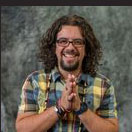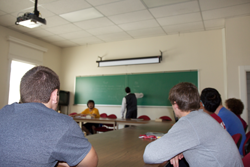
Going back to the Classroom: Professors or Educators?
As we go back to the classroom (and shake off the dust of summer), we all have mixed feelings and expectations. While some of us will just go back to the normal, others will be anxious and perhaps fearful about a new semester. The beginning of a semester can carry a feeling of being displaced, a sense that we don’t know what is coming our way and what is next. In one word: the lack of control. That is why we occupied so much of our syllabi in order to gain immediate control of that space we actually cannot control, and in fact never have controlled. What will my class be made of? How many students and who are they? Will we be able to control everything? Be fair with everybody? Be attentive to our own tasks, juggling the school’s demands and all that the teacher hopes for? The specific details of the practical aspects of our syllabus, the division of tasks, the proper tools to be used, the connections to be made, the boundaries to be established. In truth these are questions that only end when classes are over after a whole semester. Besides, after being away from the classroom for a while we may feel a little out of joint, as if the classroom is again a foreign/home space, until the map we draw (our syllabus) will help us travel through this newly foreign terrain.
 In our classrooms we are both professors and educators. Rubem Alves makes a distinction of these two roles. He says: “A professor is an employee of institutions that manage lagoons and puddles, specialist in reproduction, an instrument of the social apparel of the state. As the educator, on the contrary, [the professor] is a founder of worlds, mediator of hopes, pastor of projects.” [1]
In our classrooms we are both professors and educators. Rubem Alves makes a distinction of these two roles. He says: “A professor is an employee of institutions that manage lagoons and puddles, specialist in reproduction, an instrument of the social apparel of the state. As the educator, on the contrary, [the professor] is a founder of worlds, mediator of hopes, pastor of projects.” [1]
As we go back I wonder how our duties as professors will cast a shadow over the role of the educator. Will our pedagogies be more faithful to the management of forms of reproductions or attentive to the ways our students can become more expanded, more fully human beings? Will we dare to be a “mediator of hopes,” or a “pastor of projects?” If we only trust the readings of our classes we are more professors than educators. If we believe that the evaluation can only take a form of a formal final paper we will not tap into the rich resources of our students. If we make classrooms be a “one fit for all” place, we will make our educator side slip into the perfectly devilish/delightful combination of institutional bureaucracy and personal fears. A combination where students pay the price of teachers whose hope is confounded by fear.
In classrooms we are educators! That is why we gather together: to share knowledge as we share tastes, to share complexities and differences as we share life together. But in order to get there, we must be awakened! That is what Alves says of how to prepare the educator: “is necessary to wake her/him up… its enough that we call them from their sleep, by an act of love and courage. And when awakened, they will repeat the miracle of the instauration of new worlds.”[2]
I think we are very good at managing lagoons and puddles. However, our task as we begin our semester is to be awakened into the educators that live inside of us and be(come) a co-founder of worlds in our students, a stretcher of horizons, jokers of our common worlds and satirists of our own stupidity, doing what we do with a sense of praxis that will be able to transform actions, gestures, movements, feelings and create possibilities. In a word: dreamers of new realities!
Paulo Freire talks about this dreamer in a more academic language. Forgive the sexist language:
“Because he admires the world and therefore objectifies it, because he grasps and comprehends reality and transforms it in his action-reflection, man is a being of praxis. Even more so, man in praxis… His ontological vocation, which he ought to existentiate, is that of a subject who operates on and transforms the world. Subjugated to concrete conditions that transform him into an object, man will be sacrificing his fundamental vocation… Nobody is if he prevents others from being.”[3]
Every dreamer must start in reality, it the midst of contrasts, racial divides, economic disparities, political dualisms, violent neighborhoods, dialectical complexities and all kinds of conflicts. We must make unhidden the social processes of reality that prevent change and transformation especially for minorities and oppressed people.
Educators can (be)come the very material they use in the classroom, the texts they read, the dialogues they have, the educational tools they use, the theories they choose and the very awareness of what kind of pedagogy that they foster. We are caught into this action-reflection that stirs up, criticizes and amplifies theories and praxis. We are not detached from the world, but rather we are the result and consequence of the world we create. Our pedagogies are not meant to keep the status quo but to transform things and people, even if we know that what we do will not transform anything or anybody.
More than anything we must keep our fundamental vocation as teachers, whatever that might be, so we will not prevent students from being the fullest they can be, in the owning of their bodies, their feelings, their thoughts and their capacity to reach out, to expand, and to listen to their own selves.
As we go back to the classroom, let us awaken ourselves into the praxis of being educators! Dreaming dreams of new worlds and human beings fully stretched, while hoping for a good semester with all the rights and wrongs we will certainly make if we dare to be “a founder of worlds, mediator of hopes, pastor of projects.”
[1] Rubem Alves, Conversas com quem gosta de ensinar. (São Paulo: Cortez Editora, 1980), 27.
[2] Ibid.
[3] Paulo Freire, La Concepción problematizadora de la educación y la homanización.” Cristianismo y Sociedad. Montevideo, 1968, 18. Freire... quoted by Carlos Alberto Torres, "Dialetics, Conflict, and Dialogue," in Moacir Gadotti,
Pedagogy of Praxis: A Dialectical Philosophy of Education (New York: Suny Press, 1996).
Leave a Reply